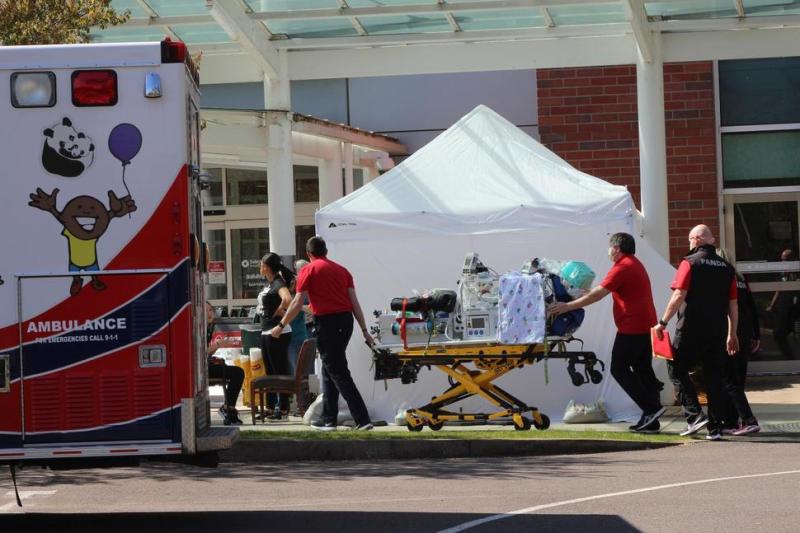Oregon Rural Hospitals Losing Revenue, Laying off Workers



SALEM, Ore. (AP) — Rural community hospitals in Oregon are seeing revenue plunge and resorting to laying off and firing employees to cope with a ban on elective surgeries while health officials battle the coronavirus outbreak.
Some hospitals have seen revenue decline as much as 60% in a month, said Becky Hultberg, CEO of the Oregon Association of Hospitals and Health Systems.
“Staffing is one of the hospital’s most significant costs. So as revenue declines, some hospitals have been forced to furlough or lay off staff,” she said.
Hospitals in the state have enough capacity to handle an expected peak in virus cases later this month, according to projections, but the association says it's too early to relax the restrictions.
Hospitals in other states are also losing revenue. On Wednesday, 19 U.S. senators — Democrat and Republican — warned that “without intervention, COVID-19 will close hundreds of rural hospitals across the country, and tens of thousands of rural patients will lose access to their nearest emergency room."
The senators, including Democrat Jeff Merkley of Oregon, told U.S. Department of Health and Human Services Secretary Alex Azar that a $100 billion federal relief fund for health care providers should prioritize rural facilities, with 20% directed to the operations.
Oregon Gov. Kate Brown on March 17 ordered that all elective and non-urgent medical procedures be cancelled or rescheduled until at least June 15 to preserve masks and other protective equipment for the state's COVID-19 response.
Some hospitals also lost revenue because fewer people visited emergency rooms, opting instead for virtual visits with a medical professional, fearing an ER could expose them to the virus.


Another huge storm is brewing across the USA as a couple of our more rural hospitals, even the bigger ones began announcing furloughs and layoffs.
Not good and restrictive State executive orders are not helping
I heard on the radio this morning that some Michigan hospitals are also laying off employees.
Yep, most of them in my area already started.
This article shows one of the problems that every Medicare-for-all plan has missed. Every plan I have seen talks about reducing costs by forcing all medical providers to accept the Medicare re-imbursement rates but that rate doesn't cover existing costs. There have been other stories about some large medical groups having to cut salaries for doctors because all the work they are doing during this crisis is all at the Medicare/Medicaid rates.
I would leave it up to each individual and their healthcare professionals. Who better to judge?
Granted, not for everyone but this cold turkey crap will just intensify and prolong the pain even longer.
Rural hospitals will go out of business. Maybe even some smaller regional ones.
Not good, not good at all.
Edit: This was a response to something SP posted which i see was removed.
Sorry Sparty, my original comment just seemed to be too redundant to to the article.
As far as the hospitals, they are eligible for the SBA loans or some other assistance from the state and the Fed.
Unfortunately, I find that my clients nationwide, are laying people off rather than go through the SBA process which always
seems invasive and laborious with no guarantees.
One large Texas wide group, gave out a generous severance packages to furloughed employees
with a proposed return date in May, so they could possible avoid applying for UE altogether.
No worries, just thought my comment looked a little funny hanging out there by itself ....
Banks and business owners are worried about getting stuck holding the bag by the Fed. Including me.
Oh, no! For-profit health care is in trouble. It must be time to bail out the insurance companies again.
Yeah, you won't laughing when hospitals start going under. Or perhaps you don't care because you think your hospitals are safe.
They aren't.
I've seen rural hospitals go under. The problem has persisted for a very long time. What the seed article highlights is that for-profit elective medical care sustains rural hospitals. The loss of for-profit business is threatening the availability of emergency and urgent care in rural areas.
The seed article highlights that medical care is a for-profit business, not a public service. That for-profit attitude threatens access to public services in rural areas. Rural areas have limited access to public education, fire protection, law enforcement, legal services, and public infrastructure because of that for-profit attitude. Rural hospitals are only the tip of the iceberg.
Allowing profiteers to control public services might work in metropolitan areas. But that is an unaffordable option for rural areas.
Yeah well in this countries for profit businesses are still allowed and are in fact the norm. The expectation that government is going to somehow make the healthcare system better is sheer lunacy.
When they start running much smaller enterprises better then I might have a little more faith.
Let me know when that happens.
You do realize this seed has nothing to do with insurance companies I hope.
You see .... what you don't realize is that the Hospitals are in cahoots with the insurance companies ......
Sounds like another conspiracy theory. Unless you believe that one business negotiating and signing a contract with another business means they are in cahoots...Because ot me that's just simple business with one side trying to control costs and the other side trying to insure that payments are sufficient for their costs and profits.
As this seed is talking about rural hospitals having to lay off workers perhaps you can shelve your snarkiness and actually reply to the underlying issue?
Lol I was being sarcastic dude
Rural hospitals have been closing at a record pace before coronavirus. Between 2013 and 2017 64 rural hospitals closed and in 2018 15 more, 2019 19 more.
Coronavirus has made the situation even worse for rural hospitals.
It isn't just the rural or small hospitals that are laying off, the big boys as well.
Yep
If there aren't enough beds in some big city hospitals, maybe they can move the infected patients to Oregon - kill two birds with one stone (Oh, maybe that wasn't a very good adage to use in this case).